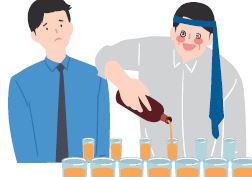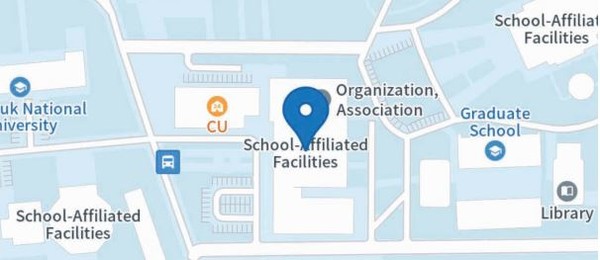
Have you ever drunk alcohol when you were upset or when you were happy? People drink depending on their mood. However, drinking alcohol makes it difficult to keep a clear head. A small amount of alcohol can be pleasurable, but too much drinking can cause accidents. As the new semester begins, it is expected that more people will drink. Accordingly, The JBNU Globe investigated the dangers of over drinking.
- Overcoming Alcohol Use Disorder
Here is a commonly seen anecdote depicting alcohol abuse. Office worker A often drinks alone at home in the aftermath of COVID-19. Almost every night, he opens three or four cans of beer while watching movies and YouTube. Sometimes, he orders a late-night snack delivery. A few days after he quits drinking, he starts to suffer from withdrawal symptoms such as anxiety, irritation, insomnia, tremors, etc., but when he drinks again, he feels relieved. Eventually, his alcohol abuse caused problems at work and home. He didn’t want to admit it at first. However, his family beseeched him to visit a rehabilitation clinic, which finally resulted in him visiting one.
- Changes in Drinking Culture after COVID-19
The overall culture of office dinners and drinks has decreased due to quarantine measures such as social distancing and banning private gatherings. Instead, a trend of drinking alone at home has been on the rise. Experts warn that if drinking alcohol little by little becomes a daily habit, it can lead to alcohol use disorder without you even knowing it. Changes in people's drinking habits due to the COVID-19 regulations have been revealed in various surveys. According to an online survey of two thousand men aged twenty to seventy nationwide conducted by the Korea Health Promotion Institute in November 2020, 63.1% of the respondents who drank less than once a week said that their drinking volume has decreased since COVID-19, and only 26.3% said that it has increased. Among those who stated that their drinking has increased, 54.1% said that the main reason was due to spending more time at home. The Korea Health Promotion Institute analyzes that the tendency to drink little by little is likely to accelerate if the COVID-19 situation continues.
How exactly does alcohol affect our bodies?
- Effects of Alcohol on Our Body

Is Alcohol Good for Health?
The main ingredient that gets you drunk in alcoholic beverages is ethyl alcohol, also called ethanol. According to 『It’s All in Your Head: Change Your Mind-Change Your Health』 by Mark Pettus, drinking alcohol in moderation, such as two drinks a day for men and one drink a day for women, can have a beneficial impact on your health. The beneficial effect of alcohol occurs when HDL(High Density Lipoprotein) blood levels rise. HDL is good cholesterol for the body and removes LDL(Low Density Lipoprotein), the cholesterol that blocks the walls of arteries. In 『Alcohol Use Disorder, number 17 of the Abnormal Psychology Series』 by Ha Hyun-ju, however, it is easy to contract physical diseases due to nutritional deficiencies, especially vitamin deficiencies because alcohol only has calories and does not have other nutrients.
What Happens When You Drink Too Much?
90% of alcohol is broken down in the liver. However, if you drink alcohol in excess, the liver cannot break down alcohol and it generates toxic substances. Consequently, damaging liver cells and biological tissues, or causing inflammation, will cause your health to deteriorate. Furthermore, sometimes the day after drinking you cannot remember part or all of your memory. This is called alcohol-induced blackout. This is caused by a neurotransmitter called glutamate. When alcohol interferes with the activity of glutamate, it can cause temporary memory loss. Repeated blackouts can lead to alcohol-induced dementia. Besides these phenomena, your alcohol tolerance can steadily increase, and when suddenly giving up alcohol after long term use, you can experience withdrawal symptoms such as anxiety, insomnia, and night sweats.
Some people drink alcohol when they are stressed, thinking that it relieves their stress. However, when using alcohol to relieve stress, it will actually make it worse, and the person will continue to seek alcohol. Repeated drinking due to stress can lead to alcohol use disorder, colloquially known as ‘alcoholism’.
What is Alcohol Use Disorder?
According to the AMA(American Medical Association) and WHO(World Health Organization), alcohol use disorder is the disease of continuously drinking alcohol despite the loss of control and negative consequences. There are many causes, but the most influential factor is genetics. Various studies found that children of alcoholics have a high rate of addiction formation even if they are adopted into non-drinking families. In alcohol use disorder, there are four stages: pre-alcoholic, early alcoholic, middle alcoholic, and end-stage alcoholism. As the stages progress, seeking alcohol, dependence on alcohol, and memory loss will become more frequent.
- Temptations of Alcohol in Everyday Life
Are you living in fear of alcohol use disorder? The JBNU Globe met Choi Chun-ho, the team leader of the Jeonju City Community Addiction Management Center.
Before we delve further into alcohol use disorder, do you want to check your alcohol disorder propensity? If so, answer the questions below.

These questions are the AUDIT(Alcohol Use Disorders Identification Test), which allows you to self-examine your problems with alcohol use. This questionnaire consists of questions covering drinking volume, drinking behavior, and mental-social anomalies for early detection and intervention of dangerous drinkers. If the total figure in the questionnaire is (for males) 10 to 19 points and (for females) 6 to 9 points, it is classified as a dangerous drinking group. Dangerous drinking groups require short-term intervention and continuous monitoring of drinking. Moreover, men who score 20 points or higher and women who score 10 points or higher, are classified with alcohol use disorders. This is a ‘presumption group of use disorders’, which can cause physical symptoms, anxiety, insomnia, social maladjustment, and depression, so careful attention and therapeutic intervention by experts are required.
Are you on the verge of addiction? If you want to prevent alcohol use disorder, what should you do? Choi recommended club activities related to addiction among universities in the province. "It is difficult to meet college students at the Jeonju City Community Addiction Management Center to form an addiction prevention support group. It's not easy to meet students there," Choi added. Therefore, it is recommended to utilize the information obtained from clubs, departments, or schools.
Why should we be so vigilant about alcohol? That’s because alcohol use disorder is a chronic disease that causes brain damage. The characteristic of chronic disease is that it has effective treatment, but it is incurable. If managed, patients can live regular life. However, it is a progressive disease that requires continuous treatment and will worsen if not treated, causing relapses. The disease damages the body’s organs, causing various complications and aftereffects. Brain diseases can affect all functions of the brain, such as processing, emotion, judgment, sensation, and motor skills, and can affect daily activities.
Then how can you get out of the alcohol swamp? According to Choi, there are currently fifty addiction management centers nationwide. In Jeollabuk-do, they are established in Jeonju and Gunsan. Addiction teams are also installed and operated in mental health welfare centers in Iksan and Jeongeup. In addition, psychiatric institutions like hospitals and clinics offer alcohol addiction treatments, such as counseling and drug prescriptions, while offering outpatient and inpatient treatment. If you are a JBNU student in need, you can visit the JBNU Happy Dream Center. It does not have any special treatment for alcohol use disorder, but you can find a way to relieve stress or inner pain caused by it.
“The process of recovering from addiction is so complex and lonely. It is essential to prevent addiction. Although life after graduation is not always easy, I hope that addiction will not hold you back in life,” Choi said. He added, “please check your drinking habits and make sure you drink responsibly in your daily life.”
Jeonju City Community Addiction Management Center

This center is conducting programs for addicts and their families. In particular, it conducts cognitive behavioral treatment, motivation reinforcement treatment, and early-stage treatment programs. In addition, it conducts an emergency treatment program, an art treatment program, and a physical health management program. 
Alternative programs also exist, in which the addicted parties and their families can participate together, and there are quarterly special external lectures. The center also supports families of addicts through family education, workshops, and outings for families to heal.
JBNU Happy Dream Center

If you are fearful of alcohol use disorder or are mentally distressed, you can take a breather through counseling. If the level of addiction is too severe, you can be linked to an external addiction treatment center, so pay a visit if you need mental care. As Choi said, we need to prevent addiction at all costs. Take a look at not only yourself but those around you. We need to be careful not to ruin a healthy and happy life just because of alcohol. Don't shut the barn door after the horse is stolen! We must take precautions before the damage is done, not after it has already happened. |
| Han Hee-jeong Editor, Park Ji-woo Reporter, Jo Soo-jin Cub-Reporter

